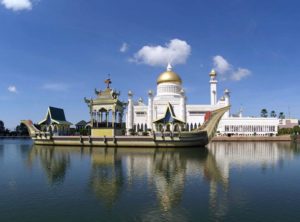
The Indian government cabinet, chaired by Prime Minister Narendra Modi, has been briefed about a Memorandum of Understanding (MoU) signed between India and the Sultanate of Brunei Darussalam covering space cooperation and the establishment of a telemetry, tracking, and command (TT&C) station in the Southeast Asian country for orbiting satellites and launch vehicles.
India also commits to cooperating with Brunei in the field of space research, science, and applications.
The agreement was signed in New Delhi on 19 July 2018 and allows India to start to operate, maintain, and augment a ground station meant for supporting India’s space launches and satellite operations. In return, India will share its experience and expertise in space activities through the training of officials, scientists, and engineers from the Sultanate of Brunei Darussalam on space and satellite technology applications.
The Sultanate of Brunei Darussalam has been courted heavily by regional powers such as China and Japan as part of the geopolitical competition for influence and primacy in Southeast Asia and the Asia-Pacific in general.
The Sultanate of Brunei MoU with India for the TT&C station and wider space cooperation can be considered a win for New Delhi, and the emerging Indo-Pacific alliance of Australia, India, Japan, and the United States, but does not preclude the possibility of the Sultanate of Brunei forging other space agreements with China and other countries in the future.
The cooperation agreement with the Sultanate of Brunei Darussalam is the latest in a number of arrangements India has made with other countries to establish satellite telemetry, tracking, and command ground stations, as well as receiving stations for Indian Earth observation and remote sensing satellites.
Among these countries are Indonesia, the island of São Tomé and Príncipe off of the West coast of Central Africa, and a remote sensing receiving station located in Vietnam for the use of Association of South East Asian Nations (ASEAN).
This Indian push in space diplomacy is likely continue as it starts in earnest its Gaganyaan human spaceflight programme that will likely need a number of TT&C and space surveillance sites around the world to provide critically important real-time support and coverage for orbiting Vyomanauts.





